|
Download programme
(print version) |
6 June
07:00–23:00 

Catherine and Alexander Parks
Parks are as important as the palace complex to the ambiance of the Tsarskoye Selo part of the city of Pushkin. The two most important of these are Catherine Park and Alexander Park, named after the palaces located within their territories.
Catherine Park is composed of two main sections: the Regular (Old Garden) Park and the Landscape (English) Park. The Regular Park is a formal garden symmetrically organizing the space around the palace, composed of a strict system of alleys, platforms, pavilions, and sculptures.
Alexander Park spans over approximately 200 ha and adjoins the parade ground (courtyard) of the Great Tsarskoye Selo (Catherine) Palace and can also be split into a regular (New Garden) park and a landscape park.
Premium Package participants may present their badge to be granted entry.
Please be advised that participants are responsible for covering the price of any tour or other additional services.
Catherine Park is composed of two main sections: the Regular (Old Garden) Park and the Landscape (English) Park. The Regular Park is a formal garden symmetrically organizing the space around the palace, composed of a strict system of alleys, platforms, pavilions, and sculptures.
Alexander Park spans over approximately 200 ha and adjoins the parade ground (courtyard) of the Great Tsarskoye Selo (Catherine) Palace and can also be split into a regular (New Garden) park and a landscape park.
Premium Package participants may present their badge to be granted entry.
Please be advised that participants are responsible for covering the price of any tour or other additional services.
6 June
10:00–20:15 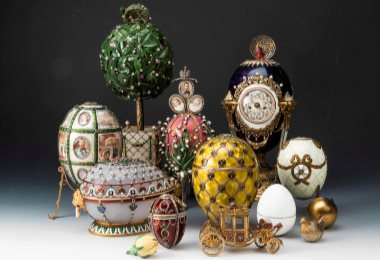

Fabergé Museum
The museum’s permanent exhibition boasts the world's largest collection of works by the famous Russian jeweller Carl Fabergé. The most treasured items in the collection are nine Easter eggs created by House of Fabergé masters for the last two Russian emperors Alexander III and Nicholas II. In addition to these internationally known masterpieces, guests will discover the surprising breadth of the jewellery work done by Fabergé and other famous Russian jewellers from the 19th to early 20th centuries: from tsars’ snuff boxes and cigarette cases to carved stone miniatures, jewellery, Russian enamel art, decorative silverware, and precious icons.
Premium Package participants may present their badge to be granted entry.
Please be advised that participants are responsible for covering the price of any tour or other additional services.
Premium Package participants may present their badge to be granted entry.
Please be advised that participants are responsible for covering the price of any tour or other additional services.
6 June
10:00–18:00 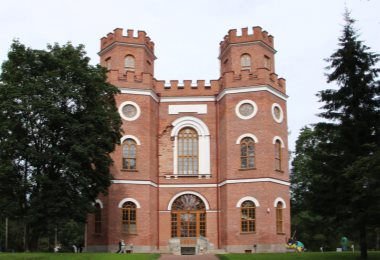

Exhibition: ‘The Arsenal of Tsarskoye Selo: The Imperial Arms Collection’
The exhibition, curated in collaboration with the State Hermitage Museum, was first opened in 2016. Items on display include the imperial collection of oriental cold steel and firearms from the 18th and 19th centuries and European arms and munitions from the 16th to 17th centuries, including armour, helmets, halberds, swords, and equestrian equipment. The State Hermitage Museum has contributed some of its own rare items for temporary display, including 16th century armour from the collection of Nicholas I.
Premium Package participants may present their badge to be granted entry.
Please be advised that participants are responsible for covering the price of any tour or other additional services.
Premium Package participants may present their badge to be granted entry.
Please be advised that participants are responsible for covering the price of any tour or other additional services.
6 June
10:00–18:00 

Russia in the Great War Museum
This is the first museum in Russia dedicated to the country’s experiences during the tragic period of World War I (1914–1917). It is located in the Martial Chamber, a building conceived by Emperor Nicholas II as a pantheon of military glory.
The exhibition showcases real munitions and day-to-day objects used by those involved in World War I, as well as print and photographic materials from the Tsarskoye Selo Museum and Heritage Site collection.
Premium Package participants may present their badge to be granted entry.
Please be advised that participants are responsible for covering the price of any tour or other additional services.
The exhibition showcases real munitions and day-to-day objects used by those involved in World War I, as well as print and photographic materials from the Tsarskoye Selo Museum and Heritage Site collection.
Premium Package participants may present their badge to be granted entry.
Please be advised that participants are responsible for covering the price of any tour or other additional services.
6 June
10:00–17:00 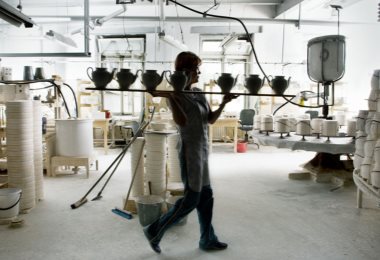

Excursion to the Imperial Porcelain Factory and its Exhibits in the Halls of the Hermitage
The Imperial Porcelain Factory invites you to uncover the mystery of its ‘white gold’. Take a tour of the factory with its 275-year history and get acquainted with its collection of unique porcelain items in the halls of the Hermitage.
Learn about modern porcelain production technologies, the secrets and legends of its unique wares created in a factory with no less than three centuries of history.
Participation in the porcelain painting master class is a unique opportunity to unleash your creative potential and feel like a real artist.
Interested Forum participants must register in advance through the personal web office.
Learn about modern porcelain production technologies, the secrets and legends of its unique wares created in a factory with no less than three centuries of history.
Participation in the porcelain painting master class is a unique opportunity to unleash your creative potential and feel like a real artist.
Interested Forum participants must register in advance through the personal web office.
6 June
10:00–17:00 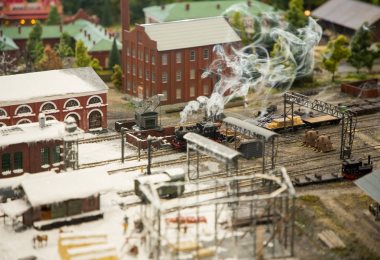

Obukhov Factory Museum
The Obukhov Steel Foundry Museum was founded at the end of the 19th century. It was located in the factory laboratory building and existed until the end of the 1920s. Nearly 50 years later, on 20 May 1976, the factory reopened the Museum of Labour, Revolutionary, and Military Glory, which was created on the initiative of the factory’s veterans and union organizations. In May 2014, as part of a large-scale project to create the North-West Regional Centre of Almaz – Antey Corp., a separate two-story building was allocated as the plant’s museum. The museum has eight rooms of permanent exhibition. The building, which now houses the museum, is a cultural heritage site. Designed by civil engineer Fedor Lumberg, it was built in 1896–1897 as the ‘House of the hospital administration with the Obukhov Steel Plant clinic’ with the funds provided by Pavel Obukhov, one of the factory’s founders.
In the building of the new museum and exhibition complex there is an interactive layout of the Obukhov plant of the late 19th and early 20th centuries, created by the joint efforts of the Museum of History of the Obukhov Plant and the founders of the legendary Grand Maket Rossiya project. The model layout represents the operation of the factory’s production facilities, the passers-by on the Shlisselburg road (now Obukhovskoy Oborony Avenue) going about their business, and the life of workers.
Forum participants may present their badge to be granted entry.
Please be advised that participants are responsible for covering the price of any tour or other additional services.
In the building of the new museum and exhibition complex there is an interactive layout of the Obukhov plant of the late 19th and early 20th centuries, created by the joint efforts of the Museum of History of the Obukhov Plant and the founders of the legendary Grand Maket Rossiya project. The model layout represents the operation of the factory’s production facilities, the passers-by on the Shlisselburg road (now Obukhovskoy Oborony Avenue) going about their business, and the life of workers.
Forum participants may present their badge to be granted entry.
Please be advised that participants are responsible for covering the price of any tour or other additional services.
6 June
10:00–18:00 

‘The Greatest Artists of Russia’ Exhibition
In the Elena Tsvetkova Jewellery House gallery, the project ‘Contemporary Heritage of Russia’, with the support of the movement ‘We Love Russia’, will present the works of the greatest contemporary artists, who have received the Gokhran of Russia award. Their works have been exhibited in the Gokhran of Russia, the Moscow Kremlin museums, the Diamond Fund of Russia, the State Historical Museum, the Hermitage, the Russian Museum and other museums across the country.
Participants need to show their badge to gain access to the exhibition.
Participants need to show their badge to gain access to the exhibition.
6 June
10:30–22:00 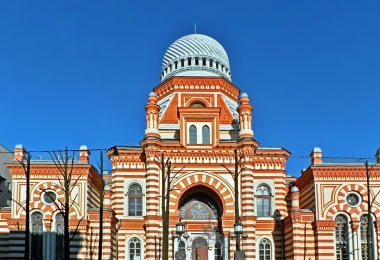

Excursion to the Grand Choral Synagogue of St. Petersburg
The Grand Choral Synagogue, one of the largest and most beautiful in Europe, has been a quintessential symbol of multinational St. Petersburg for more than 120 years. It is the centre of gravity of the cultural, religious and business life of Russia’s second largest city. The evening tour on 7 June is combined with a celebratory banquet to mark the Sabbath.
Excursion schedule:
5 June: 10:30–19:00, 20:30–22:00
6 June: 10:30–19:00, 20:30–22:00
7 June: 10:30–18:00, 18:00–22:00
Interested Forum participants must register in advance through the personal web office.
Excursion schedule:
5 June: 10:30–19:00, 20:30–22:00
6 June: 10:30–19:00, 20:30–22:00
7 June: 10:30–18:00, 18:00–22:00
Interested Forum participants must register in advance through the personal web office.
6 June
10:30–17:00 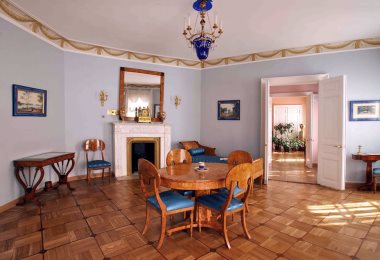

Pushkin Memorial Dacha Museum
The Pushkin Memorial Dacha Museum is located in a single-story wooden building, the original architectural façade of which has been mostly preserved. The poet Alexander Pushkin and his young wife lived in this building from May to October 1831. This dacha (summer home) was the place where he penned The Tale of Tsar Saltan, ‘Onegin’s Letter to Tatyana,’ and other works.
Forum participants may present their badge to be granted entry.
Please be advised that participants are responsible for covering the price of any tour or other additional services.
Forum participants may present their badge to be granted entry.
Please be advised that participants are responsible for covering the price of any tour or other additional services.
6 June
10:30–17:00 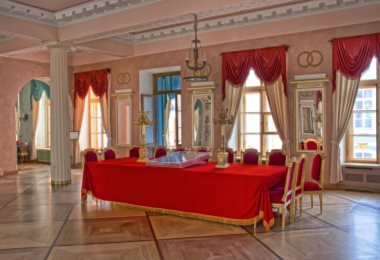

Memorial Lyceum Museum
Alexander Pushkin studied at the Imperial Lyceum of Tsarskoye Selo from 1811 to 1817. The school’s grand hall, library (featuring original books from the Lyceum's collection, some of which were a gift to the school from Alexander I), classrooms, and dormitories all help re-create the atmosphere in which the students of this privileged educational establishment lived and studied.
Forum participants may present their badge to be granted entry.
Please be advised that participants are responsible for covering the price of any tour or other additional services.
Forum participants may present their badge to be granted entry.
Please be advised that participants are responsible for covering the price of any tour or other additional services.
6 June
10:30–17:00 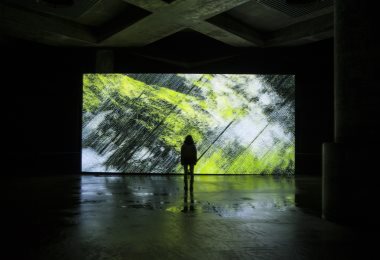

Exhibition: Artificial Intelligence and Intercultural Dialogue
The Russian Direct Investment Fund (RDIF), the Russian Federation’s sovereign wealth fund, and the State Hermitage Museum present an exhibition of works by modern artists from around the world, dedicated to the creative capabilities of artificial intelligence (AI).
AI-based contemporary art has received global recognition following the sale of a painting created by the French art group Obvious, at Christie’s Auction House on 25 October 2018. Obvious’ artists used a generative adversarial network (GAN) to mimic the creative process of human intelligence.
The exhibition also features the work of Saudi Arabian artist Lulwa Al-Homoud, who has used AI to develop a new abstract graphical language based on the Arabic alphabet; Italian artist Davide Quayola, who presents an AI ‘perception’ of classic impressionist paintings; and Turkish artist Refik Anadol, whose work Machine hallucinations was created by analysing 100,000 photographs of architecture.
The exhibition will feature the work of 14 artists and art collectives from ten countries.
A ticket is required to attend the exhibition and can be purchased at one of the museum’s ticket offices.
AI-based contemporary art has received global recognition following the sale of a painting created by the French art group Obvious, at Christie’s Auction House on 25 October 2018. Obvious’ artists used a generative adversarial network (GAN) to mimic the creative process of human intelligence.
The exhibition also features the work of Saudi Arabian artist Lulwa Al-Homoud, who has used AI to develop a new abstract graphical language based on the Arabic alphabet; Italian artist Davide Quayola, who presents an AI ‘perception’ of classic impressionist paintings; and Turkish artist Refik Anadol, whose work Machine hallucinations was created by analysing 100,000 photographs of architecture.
The exhibition will feature the work of 14 artists and art collectives from ten countries.
A ticket is required to attend the exhibition and can be purchased at one of the museum’s ticket offices.
6 June
11:00–18:00 
Exhibition: ‘Arctic Nomads: The Art of Movement’
A variety of multimedia materials collected during research expeditions to Yamal, Chukotka, and the Kola Peninsula accompany 95 rare items from the Museum of Anthropology and Ethnography’s collection. The exhibition is a vivid depiction of the current nomadic traditions of the indigenous peoples of the Arctic.
Forum participants may present their badge to be granted entry.
Please be advised that participants are responsible for covering the price of any tour or other additional services.
Forum participants may present their badge to be granted entry.
Please be advised that participants are responsible for covering the price of any tour or other additional services.
6 June
11:00–19:00 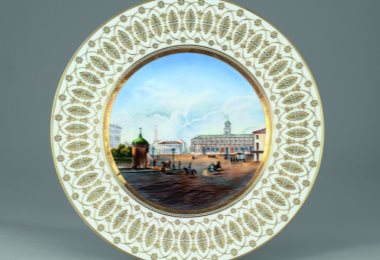

Exhibition: ‘A story that will continue’
This exhibition is about the artistic journey of the Imperial Porcelain Factory, the renowned St. Petersburg porcelain producer, from its foundation in 1744 to the present day: about the origin of porcelain in Russia, the invention and development of new production technologies and decorative techniques, the factory’s craftsmen, and the works they create today, which bring prestige to Russian art. In the exhibition, more than 1,300 porcelain items of the 18th–21st centuries, all stamped with the seal of the Imperial Porcelain Factory, will enable visitors to trace the main trends in the art of Russian porcelain over almost three centuries.
Forum participants may present their badge to be granted entry.
Please note that participants are responsible for covering the price of excursions or other additional services.
Forum participants may present their badge to be granted entry.
Please note that participants are responsible for covering the price of excursions or other additional services.
6 June
11:00–22:00 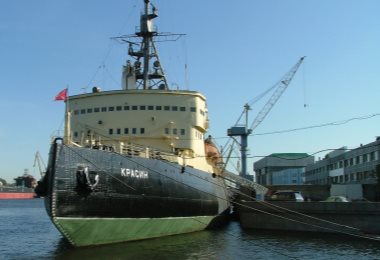

Legendary Icebreaker Krasin welcomes visitors
This tour offers you an exciting story of Russia’s icebreaking fleet and Arctic exploration, a visit to the captain’s cabin, the chartroom and the pilot room of the legendary icebreaker Krasin. Keel laying took place in 1916 in England; the order was placed by the Government of the Russian Empire. On 31 March 1917, St. Andrew’s flag was flown on board of the vessel, and the icebreaker was commissioned the same year. In 1928, the ship’s crew received the Soviet Union’s top award for saving Umberto Nobile’s expedition that crashed on the airship Italia near Spitsbergen. Krasin took two circumnavigational voyages. During World War II, the ship participated in many polar convoys, and then for many years Krasin served the Northern Sea Route. Later the icebreaker got the status of a research vessel. The first Arctic oil and gas exploration expedition (1974–1976) took place in the Russian Arctic shelves and used Krasin as the floating power station for the marine geological field party. Krasin has been a branch of the Museum of the World Ocean in St. Petersburg for the last 15 years.
Operating hours:
11:00–18:00 – tours start every hour, subject to turn-out. The last tour starts at 17:00.
18:00–22:00 – leisure time on ship deck.
Premium Package participants can present their badge to gain access. Participants in other categories can purchase admission at a reduced price on presentation of their badge.
Operating hours:
11:00–18:00 – tours start every hour, subject to turn-out. The last tour starts at 17:00.
18:00–22:00 – leisure time on ship deck.
Premium Package participants can present their badge to gain access. Participants in other categories can purchase admission at a reduced price on presentation of their badge.
6 June
11:00–21:00 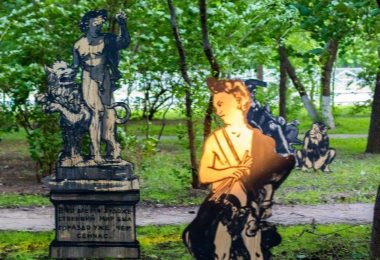

Street exhibition by Alexander Shishkin-Hokusai on Telezhny Pereulok
An exhibition by the contemporary St. Petersburg artist Alexander Shishkin-Hokusai, participant in the 58th Venice Biennale, will take place on 5–30 June on Telezhny Pereulok. The artist has prepared an exhibition for residents and guests of St. Petersburg which echoes the iconic sights of the city.
The exhibition will be the first project in the Art Programme of the Staronevsky Prospekt association, created together with the BABOCHKA chain of boutiques, the local offices of Louis Vuitton, Chanel, Dior and others to develop Staronevsky Prospekt, a historical area of St. Petersburg.
Free admission.
The exhibition will be the first project in the Art Programme of the Staronevsky Prospekt association, created together with the BABOCHKA chain of boutiques, the local offices of Louis Vuitton, Chanel, Dior and others to develop Staronevsky Prospekt, a historical area of St. Petersburg.
Free admission.
6 June
13:00–20:30 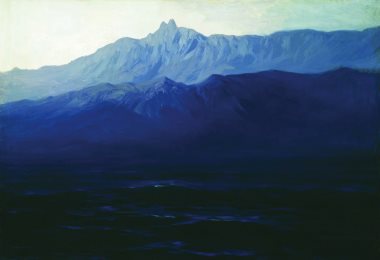

‘Crimea Through the Paintings of Arkhip Kuindzhi’ Exhibition
The Russian Museum contains numerous works of art created in Crimea and received as a gift from the Arkhip Kuindzhi Society. They follow the soul searching and artistic quest of the painter through his study of colour relationships and contrasts and the generalisation of form. He contemplated the movement of clouds over the sea and steppe, atmospheric fluctuations during the day, fog and sunsets.
The exhibition in the Garden Vestibule of the Mikhailovsky Palace presents selected paintings by Arkhip Kuindzhi devoted to the natural landscapes of Crimea. In his paintings, as in all creative heritage, he conveyed the diversity of the beautiful and eternal in nature, as seen by his admiring eyes.
Premium package participants need to show their badge to gain access to the exhibition.
Please note that the museum tour and other additional services are paid by the participant separately.
The exhibition in the Garden Vestibule of the Mikhailovsky Palace presents selected paintings by Arkhip Kuindzhi devoted to the natural landscapes of Crimea. In his paintings, as in all creative heritage, he conveyed the diversity of the beautiful and eternal in nature, as seen by his admiring eyes.
Premium package participants need to show their badge to gain access to the exhibition.
Please note that the museum tour and other additional services are paid by the participant separately.
6 June
13:00–20:30 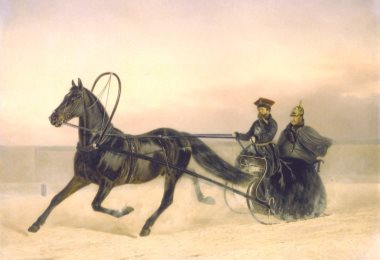

‘Nicholas I’ Exhibition
The exhibition from the The Saga of the Romanovs cycle explores the personality of Nicholas I alongside his foreign policy, ideology, influence over national culture and society as a whole, and life in the imperial court and the royal family, as reflected in paintings, drawings, coins and decorative and applied arts. The exposition includes numerous ceremonial portraits of Emperor Nicholas I, his associates and members of the royal family, created by artists and sculptors of the calibre of George Dow, Franz Krüger, Orest Kiprensky, Fyodor Tolstoy, and others. The paintings and drawings, ceremonial monumental vases and dinnerware, furniture, bronzeware, rare coins, and the many other furnishings that make up the exhibition give a sense of the artistic life of a prosperous country, and of the sophisticated interiors of the royal residences and the life of the highest court.
Premium package participants need to show their badge to gain access to the exhibition.
Please note that the museum tour and other additional services are paid by the participant separately.
Premium package participants need to show their badge to gain access to the exhibition.
Please note that the museum tour and other additional services are paid by the participant separately.
6 June
13:00–20:30 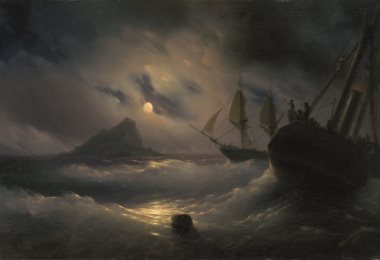

‘Three St. Petersburg Collections’ Exhibition
The exhibition displays paintings, drawings, sculptures, theatrical decorative and ornamental art and the coins of three private collections in St. Petersburg: the Paleev family, Vladimir Berezovsky and Kirill and Julia Naumov. The exposition introduces practically unknown works of the greatest Russian artists of the 19th–20th centuries: Ivan Aivazovsky, Nathan Altman, Léon Bakst, Alexandre Benois, Mikhail Vrubel, Natalia Goncharova, Boris Kustodiev, Konstantin Korovin, Kuzma Petrov-Vodkin, Ilya Repin, Zinaida Serebriakova, Konstantin Somov, and others.
Premium package participants need to show their badge to gain access to the exhibition.
Please note that the museum tour and other additional services are paid by the participant separately.
Premium package participants need to show their badge to gain access to the exhibition.
Please note that the museum tour and other additional services are paid by the participant separately.
6 June
15:00–17:00 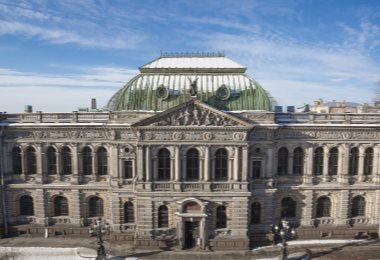

Tour of the Exhibition ‘Golden Thread – Road of Creativity’
The 4th International Biennale of Hot Enamel Art ‘Golden Thread – Road of Creativity’ will be held in the halls of the Stieglitz Academy educational Museum of Applied Art. The exhibition will include works by contemporary enamel artists, professionals from various countries, and teachers and students from Russian and international universities.
The exhibition will present artistic traditions and experimental techniques used to create original works of art using hot enamel techniques, showcasing the diverse approaches of a number of artists and schools.
In addition to this exhibition, guests will also be able to peruse the works of the Museum of Applied Art’s permanent collection.
Tours are held twice a day, starting at 15:00 and 16:00.
Interested Forum participants must register in advance through the personal web office.
The exhibition will present artistic traditions and experimental techniques used to create original works of art using hot enamel techniques, showcasing the diverse approaches of a number of artists and schools.
In addition to this exhibition, guests will also be able to peruse the works of the Museum of Applied Art’s permanent collection.
Tours are held twice a day, starting at 15:00 and 16:00.
Interested Forum participants must register in advance through the personal web office.
6 June
15:00–16:30 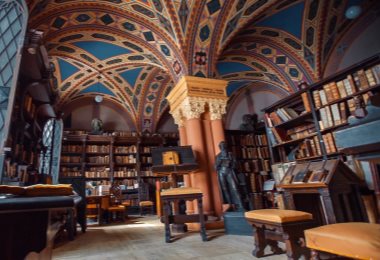

Tour of the Main Building of the National Library of Russia
The National Library of Russia is the oldest public library in Russia. It was founded at the behest of Catherine II in 1795.
The library's main building occupies an entire city block located in between Sadovaya Ulitsa, Nevsky Prospekt, and Ostrovsky Square.
During the tour guests will learn about the library's history, famous staff members, and some of its unique collections. The tour programme will include visits to historical rooms that are usually not accessible to library visitors, including the Russian Books Collection, the Rare Books collection, Voltaire’s Library, and the Manuscripts collection.
Interested Forum participants must register in advance through the personal web office.
The library's main building occupies an entire city block located in between Sadovaya Ulitsa, Nevsky Prospekt, and Ostrovsky Square.
During the tour guests will learn about the library's history, famous staff members, and some of its unique collections. The tour programme will include visits to historical rooms that are usually not accessible to library visitors, including the Russian Books Collection, the Rare Books collection, Voltaire’s Library, and the Manuscripts collection.
Interested Forum participants must register in advance through the personal web office.
6 June
15:00–16:00 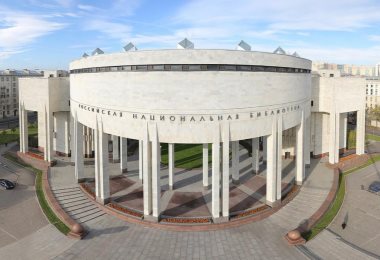

Tour of the New Building of the National Library of Russia
During this tour, knowledgeable guides will describe the contents of the library's collections, catalogues, reading room locations, and services offered to library visitors.
Particular attention will be paid to new storage and preservation technologies.
The tour will be given in Russian.
Interested Forum participants must register in advance through the personal web office.
Particular attention will be paid to new storage and preservation technologies.
The tour will be given in Russian.
Interested Forum participants must register in advance through the personal web office.
6 June
15:00–16:00 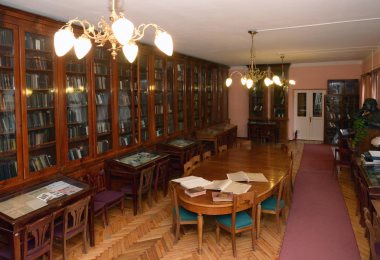

Tour of the Plekhanov House of the National Library of Russia
This tour is intended to show guests items from the rooms of the Free Economic Society and the Geneva apartment of the Plekhanovs.
Guests will be able to see particularly interesting documents from the library's collection: books featuring handwritten notes by Georgi Plekhanov, publications featuring the autographs of famous people from that era, and the stamps of political and social organization libraries, which all come together to tell the story of how Georgi Plekhanov’s personal library was formed.
The tour will be given in Russian.
Interested Forum participants must register in advance through the personal web office.
Guests will be able to see particularly interesting documents from the library's collection: books featuring handwritten notes by Georgi Plekhanov, publications featuring the autographs of famous people from that era, and the stamps of political and social organization libraries, which all come together to tell the story of how Georgi Plekhanov’s personal library was formed.
The tour will be given in Russian.
Interested Forum participants must register in advance through the personal web office.
6 June
16:00–17:00 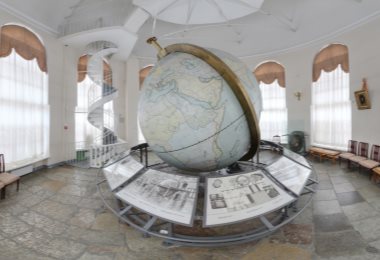

Gottorp (Greater Academic) Globe Tour Led by Chief Collection Manager Natalia Kopaneva
The Gottorp Globe is a unique example of late 17th century engineering ingenuity. The rotating mechanism remains functional to this day. The outside of the globe features a map of the world, while the inside houses a map of the night sky.
The tour will be given in Russian.
Interested Forum participants must register in advance through the personal web office.
The tour will be given in Russian.
Interested Forum participants must register in advance through the personal web office.
6 June
16:00–18:00 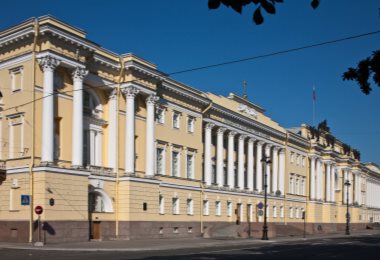

Tour: A 21st Century Library in the Historical Synod Building
The Boris Yeltsin Presidential Library is the largest information, cultural, and educational centre in Russia. The tour will guide guests through the historical interiors of the Synod building and the contemporary halls of the Presidential Library, which were created for holding social and state events. The latter include a conference hall and a transforming multimedia hall, which features the latest 3D-enabled technologies, Part of the excursion is a presentation of the library’s electronic collection, which is stored in the Electronic Reading Room and on the Library's Internet portal. The collection includes materials on Russian history, the theory and practice of Russian statehood, the Russian language, literature, geography, and law. Guests will learn about the temporary and permanent exhibitions located within Constitution Hall, which is also home to the singular inaugural copy of the Constitution of the Russian Federation.
Tours are held twice a day, starting at 16:00 and 17:00.
Tour groups gather in the main foyer of the Presidential Library before meeting their guides.
Forum participants may present their badge to be granted entry.
Tours are held twice a day, starting at 16:00 and 17:00.
Tour groups gather in the main foyer of the Presidential Library before meeting their guides.
Forum participants may present their badge to be granted entry.
6 June
16:00–20:00 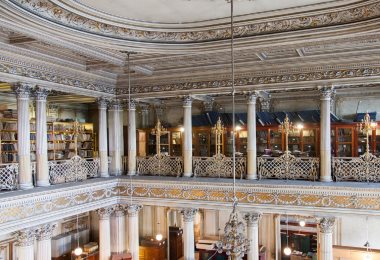

Exhibition: ‘The Manuscript Treasures of the East on the Banks of the Neva River’
Institute of Oriental Manuscript’s presents a selection of manuscript masterpieces from the East. The Institute houses one of the largest collections of manuscripts in the world – the largest in Russia – with over 115,000 items in 65 modern and dead languages. This unique collection is located in the luxurious interior of the Novo-Mikhailovsky (New Michael) Palace, a vivid example of 19th century palace architecture.
Forum participants may present their badge to be granted entry.
Forum participants may present their badge to be granted entry.
6 June
17:00–18:00 
‘Arctic Nomads: The Art of Movement’ Tour Led by Kunstkamera Director Andrei Golovnev
This tour will consider the expeditions during which the exhibition’s multimedia materials were collected and why multimedia exhibits complement the historical items from the museum’s collection so well. It will also touch on the idea of how nomadic traditions may be useful for urban people and modern businesses.
Interested Forum participants must register in advance through the personal web office.
Interested Forum participants must register in advance through the personal web office.
6 June
18:30–21:45 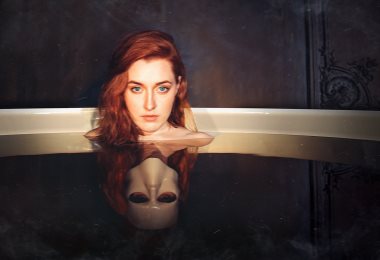

The ‘Faceless’ Immersive Show
‘Faceless’ is an alternate reality theatrical performance. There are no stages or curtains, and the main character is played by the viewer themselves.
In this immersive performance, theatregoers become a part of the action, space, and atmosphere and interact with characters that will help them seek answers to their innermost questions.
‘Faceless’ takes place over four floors of an over 300-year-old mansion in the heart of St. Petersburg.
Viewers will have the chance to meet 16 characters, traverse over 50 rooms, and, most importantly, see one of three simultaneous endings.
The script of ‘Faceless’ was inspired by the play ‘Ghosts’ by the playwright Henrik Ibsen. The performance is a prequel, describing the strange happenings that occurred five hours before the events of the play.
Directors: Migel, Mia Zanette.
A ticket is required to attend the performance and can be ordered via the personal web office.
Participants are responsible for covering the price of attendance.
In this immersive performance, theatregoers become a part of the action, space, and atmosphere and interact with characters that will help them seek answers to their innermost questions.
‘Faceless’ takes place over four floors of an over 300-year-old mansion in the heart of St. Petersburg.
Viewers will have the chance to meet 16 characters, traverse over 50 rooms, and, most importantly, see one of three simultaneous endings.
The script of ‘Faceless’ was inspired by the play ‘Ghosts’ by the playwright Henrik Ibsen. The performance is a prequel, describing the strange happenings that occurred five hours before the events of the play.
Directors: Migel, Mia Zanette.
A ticket is required to attend the performance and can be ordered via the personal web office.
Participants are responsible for covering the price of attendance.
6 June
19:00–21:30 
Melodies of Hollywood and Broadway. Concert
The programme will include famous pieces from Hollywood films and Broadway musicals that the great jazz musicians of the past turned into the pillars of the genre. Performers will present their original interpretations of George Gershwin, Jerome Kern, Irving Berlin, and many other renowned American composers.
The jazz parade brings together Elvira Trafova, Yulia Kasian, Tatiana Bubelnikova, Fyodor Durandin, and David Goloshchekin Jazz Ensemble.
A ticket is required to attend the event and can be ordered via the personal web office.
Participants are responsible for covering the price of attendance.
The jazz parade brings together Elvira Trafova, Yulia Kasian, Tatiana Bubelnikova, Fyodor Durandin, and David Goloshchekin Jazz Ensemble.
A ticket is required to attend the event and can be ordered via the personal web office.
Participants are responsible for covering the price of attendance.
6 June
19:00–21:00 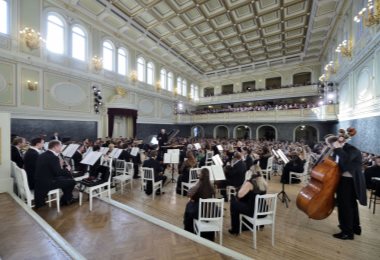

Concert of St. Petersburg State Academic Capella Symphony Orchestra
The concert will include musical pieces of different epochs and styles: from recognized classics such as Rimsky-Korsakov and Tchaikovsky to outstanding contemporary composers like Gilliland and Shor. Solo: Julian Milkis, clarinet. Conductor: Alexander Chernushenko, People’s Artist of Russia.
A ticket is required to attend the event and can be ordered via the personal web office.
Participants are responsible for covering the price of attendance.
A ticket is required to attend the event and can be ordered via the personal web office.
Participants are responsible for covering the price of attendance.
6 June
19:00–22:00 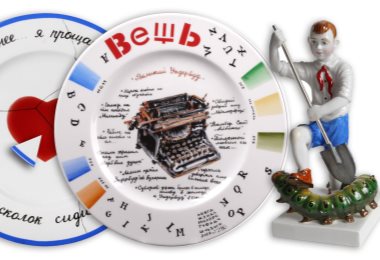

Grand Opening of the ‘St. Petersburg Characters’ Exhibition
The grand opening of the Anatoly Belkin exhibition ‘St. Petersburg Characters’. Participants and guests of the Forum can enjoy an unforgettable evening in good company in the heart of St. Petersburg and try themselves as a porcelain artist.
For Premium package participants attendance to the event is by invitation.
For Premium package participants attendance to the event is by invitation.
6 June
19:00–21:00 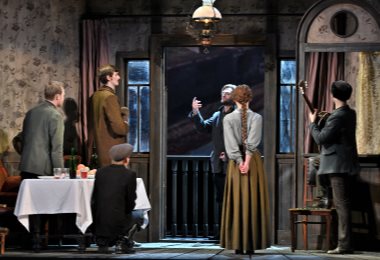

‘The Birth of Stalin’ Theatre Performance
The Birth of Stalin is a play by Valery Fokin about spiritual and moral revival, about the transformation of the young revolutionary Joseph Dzhugashvili into a leader, about the disappearance of a man and the birth of a tyrant.
The performance is in Russian with simultaneous translation into English.
The legendary Alexandrinsky Theatre is the oldest national imperial theatre in Russia. It was established by Order of Empress Elizabeth, daughter of Peter the Great, on 30 August 1756. Alexandrinsky Theatre spawned Russian theatre as a whole, and the date of its foundation is considered the anniversary of Russian professional theatre.
This event is by ticket only, which can be ordered through the personal web office.
The ticket is paid by the participant separately.
The performance is in Russian with simultaneous translation into English.
The legendary Alexandrinsky Theatre is the oldest national imperial theatre in Russia. It was established by Order of Empress Elizabeth, daughter of Peter the Great, on 30 August 1756. Alexandrinsky Theatre spawned Russian theatre as a whole, and the date of its foundation is considered the anniversary of Russian professional theatre.
This event is by ticket only, which can be ordered through the personal web office.
The ticket is paid by the participant separately.
6 June
19:30–22:00 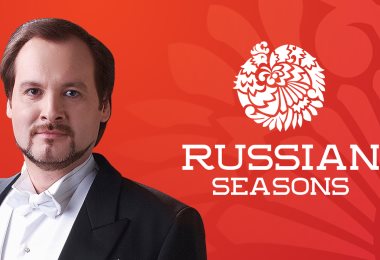

Evening Reception of the International Cultural Project ‘Russian Seasons’
At the event, the ambassadors of Russian Seasons will be announced, chosen from prominent Russian artists.
The concert, organised by the international cultural project Russian Seasons and the Russian-German Academy of Music, will see performances by winners of international competitions and famous performers from Russia and Germany: Thomas Reif (violin), Aylen Pritchin (violin), Dinara Muratova (viola), Elizaveta Zolotova (viola), Jacob Shteppe (cello), Ivan Sendetsky (cello), Olga Pudova (soprano), Askar Abdrazakov (bass), and Nikolaus Rexroth (piano).
In 2019 Germany will host Russian Seasons, so the concert programme is focused on the close musical ties between the countries. Pyotr Tchaikovsky's sextet Souvenir de Florence will evoke Italy, which hosted Russian Seasons in 2018.
The opera pieces will be performed by soloists from the Mariinsky Theatre, which is where the Russian-German Academy of Music rehearses on a permanent basis under the artistic direction of maestro Valery Gergiev.
This event is open to Premium Package participants by invitation only.
More information about this event can be found in the personal web office.
The concert, organised by the international cultural project Russian Seasons and the Russian-German Academy of Music, will see performances by winners of international competitions and famous performers from Russia and Germany: Thomas Reif (violin), Aylen Pritchin (violin), Dinara Muratova (viola), Elizaveta Zolotova (viola), Jacob Shteppe (cello), Ivan Sendetsky (cello), Olga Pudova (soprano), Askar Abdrazakov (bass), and Nikolaus Rexroth (piano).
In 2019 Germany will host Russian Seasons, so the concert programme is focused on the close musical ties between the countries. Pyotr Tchaikovsky's sextet Souvenir de Florence will evoke Italy, which hosted Russian Seasons in 2018.
The opera pieces will be performed by soloists from the Mariinsky Theatre, which is where the Russian-German Academy of Music rehearses on a permanent basis under the artistic direction of maestro Valery Gergiev.
This event is open to Premium Package participants by invitation only.
More information about this event can be found in the personal web office.
6 June
19:30–22:30 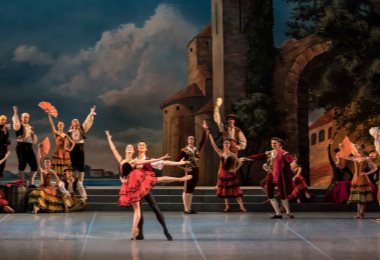

Ballet: Don Quixote
Colourful, vibrant, direct, spontaneous: all these epithets can be applied to Don Quixote, but none of them can fully convey the sense of joy that the ballet invariably arouses in the audience. The red capes of the toreadors, the strumming of guitars, the clicking of castanets, coquettish glances from behind open fans... The enchanting levity of the ‘ballet of Spain’ surges onto the Mikhailovsky Theatre stage. Each performer interprets this ballet in their own way. While it demands virtuosity and stamina, the dancers are given complete freedom of choice in the way they act the parts. It is possible to depict the sincerity and straightforwardness of the characters or present them as cunning deceivers; place an emphasis on simple domestic details, or portray fiery passions. The permutations are endless, and therein lies one of the secrets of the ballet’s phenomenal popularity.
A ticket is required to attend the event and can be ordered via the personal web office.
Participants are responsible for covering the price of attendance.
A ticket is required to attend the event and can be ordered via the personal web office.
Participants are responsible for covering the price of attendance.
6 June
19:30–22:30 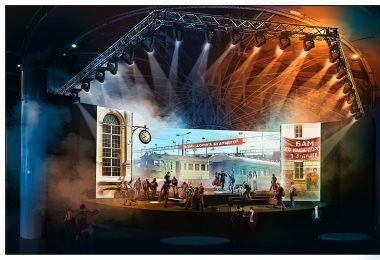

‘Night at the Museum’
This event will celebrate the 45th anniversary of the start of construction of the Baikal–Amur Mainline. The event will include a musical tour by Garik Sukachov and the Campanella Stone Star orchestra.
This event is open to Premium Package participants by invitation only.
This event is open to Premium Package participants by invitation only.
6 June
20:00–23:00 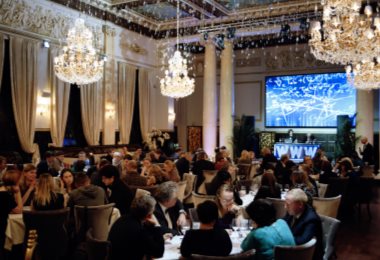

‘Russia and the World’ Non-Trivial Game
Quiz Game.
Hosts: Mikhail Skipsky, player of the ‘What? Where? When?’ Club, and actor Andrey Maksimkov.
A simultaneous game for 15–20 teams (6 players per team).
The questions will address the past and the present of Russia’s cooperation with the global community in the fields of culture, science and business: great scholars, famous authors, Nobel Prize winners, as well as contemporary events that rank Russia among the most influential powers of the world.
This event is open to Premium and Standard Package participants by invitation only. Prior registration is required.
More information about this event can be found in the personal web office.
Hosts: Mikhail Skipsky, player of the ‘What? Where? When?’ Club, and actor Andrey Maksimkov.
A simultaneous game for 15–20 teams (6 players per team).
The questions will address the past and the present of Russia’s cooperation with the global community in the fields of culture, science and business: great scholars, famous authors, Nobel Prize winners, as well as contemporary events that rank Russia among the most influential powers of the world.
This event is open to Premium and Standard Package participants by invitation only. Prior registration is required.
More information about this event can be found in the personal web office.
6 June
20:00–22:30 
Le Corsaire
Ballet in three acts with a prologue and epilogue.
Music by Adolphe Adan, Cesare Pugni, Léo Delibes, Riccardo Drigo and Pyotr Oldenburgsky.
Libretto by Henri Vernoy de Saint-Georges and Joseph Mazilier, edited by Yuri Slonimsky and Pyotr Gusev.
Choreography by Pyotr Gusev (1987) based on the composition and choreography of Marius Petipa.
A ticket is required to attend the event and can be ordered via the personal web office.
Participants are responsible for covering the price of attendance.
Music by Adolphe Adan, Cesare Pugni, Léo Delibes, Riccardo Drigo and Pyotr Oldenburgsky.
Libretto by Henri Vernoy de Saint-Georges and Joseph Mazilier, edited by Yuri Slonimsky and Pyotr Gusev.
Choreography by Pyotr Gusev (1987) based on the composition and choreography of Marius Petipa.
A ticket is required to attend the event and can be ordered via the personal web office.
Participants are responsible for covering the price of attendance.
6 June
22:00–00:00 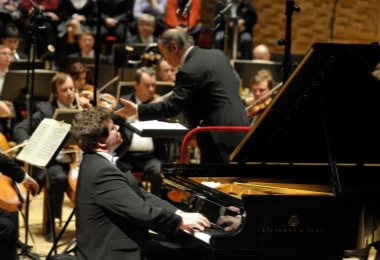

Late-night concert: Denis Matsuev and Valery Gergiev
Soloist – Denis Matsuev (piano)
The Mariinsky Orchestra
Conductor – Valery Gergiev
Programme:
Claude Debussy – Prélude à l'après-midi d'un faune;
Sergei Rachmaninoff – Piano Concerto No. 4 in G minor, Op. 40;
Maurice Ravel – Boléro.
A ticket is required to attend the event and can be ordered via the personal web office.
Participants are responsible for covering the price of attendance.
The Mariinsky Orchestra
Conductor – Valery Gergiev
Programme:
Claude Debussy – Prélude à l'après-midi d'un faune;
Sergei Rachmaninoff – Piano Concerto No. 4 in G minor, Op. 40;
Maurice Ravel – Boléro.
A ticket is required to attend the event and can be ordered via the personal web office.
Participants are responsible for covering the price of attendance.




